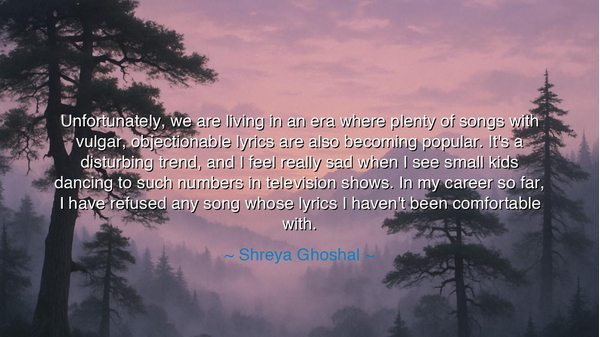
Unfortunately, we are living in an era where plenty of songs with
Unfortunately, we are living in an era where plenty of songs with vulgar, objectionable lyrics are also becoming popular. It's a disturbing trend, and I feel really sad when I see small kids dancing to such numbers in television shows. In my career so far, I have refused any song whose lyrics I haven't been comfortable with.






There is a solemn and noble conviction in the words of Shreya Ghoshal, who said, “Unfortunately, we are living in an era where plenty of songs with vulgar, objectionable lyrics are also becoming popular. It's a disturbing trend, and I feel really sad when I see small kids dancing to such numbers in television shows. In my career so far, I have refused any song whose lyrics I haven't been comfortable with.” In these words, the artist speaks not only as a singer but as a guardian of culture — one who recognizes that art has power, and with that power comes responsibility. Her lament is not against music itself, but against the erosion of purity, dignity, and moral harmony in the art that shapes hearts and minds.
The origin of this quote lies in Ghoshal’s long and illustrious journey through Indian music — a path marked by reverence for melody, discipline, and meaning. Having been trained in the classical traditions of song, she grew up in a culture that treated music as sacred — an offering, not a product. Thus, when she speaks of vulgar lyrics and the sadness of seeing children imitate them, she is mourning not only for the art form, but for the soul of a generation. In her refusal to sing words that degrade rather than uplift, she upholds an ancient principle known to all true artists: that music should elevate the spirit, not corrupt it.
The ancients, too, understood this truth. In Plato’s Republic, the philosopher warned that music shapes the soul, and that the wrong kind of song — one that glorifies base desires — could unravel the fabric of society. “Let me make the songs of a nation,” said another wise man, “and I care not who makes its laws.” For laws govern actions, but songs govern hearts. When Ghoshal laments the popularity of vulgarity, she is echoing this timeless wisdom — that when the rhythms of a culture become impure, its people begin to lose their sense of beauty, humility, and restraint.
History offers us many examples of artists who resisted corruption in their art. The poet Rabindranath Tagore, though surrounded by political turmoil, never allowed his verse to become cynical or coarse. He wrote instead of compassion, nature, and the divine spark in humanity. Similarly, Lata Mangeshkar, whom Ghoshal often cites as her inspiration, upheld the sanctity of song throughout her life, refusing lyrics that degraded women or love. These artists understood that art is not merely expression; it is influence. It shapes how we see ourselves, how we speak, how we treat one another. When art descends into vulgarity, the collective conscience follows.
Ghoshal’s sadness at seeing children dance to songs with objectionable lyrics carries profound symbolic meaning. Children are the mirrors of our culture — they imitate what they see, absorb what they hear. When innocence dances to indecency, it signals not the joy of youth, but the failure of guidance. To her, and to all who still honor the sacred nature of music, this is not entertainment; it is desecration. Her refusal to sing such songs is, therefore, not pride, but protest — a quiet, steadfast rebellion against a tide of degradation. She chooses to protect the sanctity of her voice, knowing that every word sung in sincerity can either heal or harm the listener’s soul.
The ancients would call her choice an act of dharma — right conduct in an age of confusion. In a world where fame and fortune tempt even the most gifted to compromise, to choose purity over popularity is a rare and heroic act. For Ghoshal, integrity is more beautiful than applause, and truth more enduring than trend. Her example reminds us that every artist, every teacher, every parent, must become a guardian of values, for what we tolerate today becomes the habit of tomorrow.
The lesson, my children, is this: never trade virtue for visibility, nor art for attention. Whether your craft is in music, words, or deeds, let it serve what is noble. Create beauty that endures — the kind that strengthens minds and softens hearts. Refuse what is false, even when it is fashionable; defend what is pure, even when it is mocked. For art that offends may glitter for a moment, but art that uplifts shines for generations.
And so, remember Shreya Ghoshal’s wisdom: the artist’s first duty is not to please the crowd, but to honor truth. If your work inspires goodness, you serve something greater than fame — you serve the spirit of humanity itself. Let your voice, like hers, be one that chooses light over noise, meaning over madness. For when art is guided by conscience, it becomes not just entertainment, but immortality.






AAdministratorAdministrator
Welcome, honored guests. Please leave a comment, we will respond soon